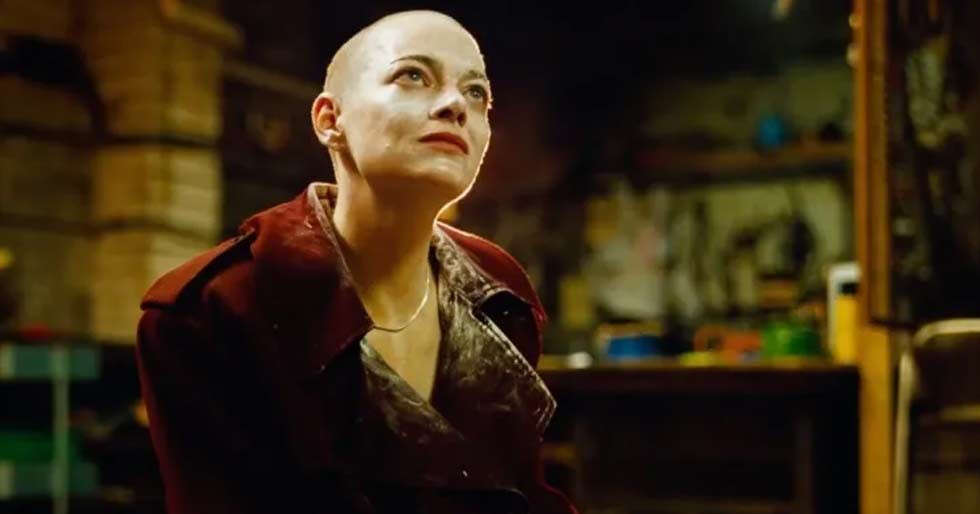The story follows two disillusioned men, Teddy Gatz (Jesse Plemons) and Don (Aidan Delbis), his neurodivergent cousin, convinced that a powerful pharmaceutical CEO, Michelle Fuller, played by Emma Stone, is, in fact, an alien orchestrating the demise of humanity. Acting on their paranoid conviction, they kidnap her and hold her captive in a basement, hoping to obtain a confession that might “save the planet.” What follows is a strange, often disturbing tug-of-war between deception and truth, power and powerlessness, depicted with Lanthimos’ signature blend of deadpan humor and unsettling precision.
The director has once again worked with his long-time collaborator, cinematographer Robbie Ryan, who has used wide-angle lenses, one-point perspectives, and exaggerated depth of field to create a world that feels both clinical and grotesque. The film is shot in VistaVision, giving its carefully composed frames a greater sense of visual distortion. Every space seems too bright, every face too close, every pause too long. It’s a film built on discomfort, using form as a mirror for its fractured themes.
At the center of this disorienting narrative are two magnetic performances. Emma Stone, continuing her fruitful collaboration with Lanthimos, turns the cold composure of a corporate titan into something unsettling and unreadable. His role demands restraint and ambiguity and he excels on all fronts. Another Oscar nomination appears to be on the way. It’s never entirely clear whether she’s a manipulative CEO or an alien predator, and that’s exactly the point.
Opposite her, Jesse Plemons gives the best performance of his career as the unhinged beekeeper turned conspiracy theorist. He embodies his character’s paranoia with terrifying sincerity, balancing absurdist humor with profound tragedy. Plemons steals the show, grounding the film’s surreal energy in something painfully recognizable, the modern paranoia that fuels misinformation and distrust online. Aidan Delbis is autistic and, therefore, his act rings with a lived truth.
Thematically, Bugonia delves into several terrains: environmental collapse, corporate greed, and the seductive logic of conspiracy theories. It is a film about power structures and the fragile human need to find meaning in chaos. In that sense, it seems eerily reflective of our own moment, where truth has become a matter of belief and belief a weapon of survival. Lanthimos does not give his audience answers, but instead creates a cinematic space where the absurd feels like the only rational response to the world.
However, for all its ambition, Bugonia is not without its flaws. The middle act, dominated by the hostage scenario, begins to drag under the weight of its own repetition. The shifts in tone from farce to horror to philosophical reflection can be jarring, even indulgent. The film raises questions about faith, power and truth, but leaves them suspended, unresolved, perhaps intentionally.
Ultimately, Bugonia is a film that challenges you to get involved or walk away. It is not intended for those seeking tidy endings, straightforward narratives, or moral clarity. But for viewers willing to surrender to Lanthimos’ twisted vision of the world, it offers a biting, funny, and often disturbing reflection of contemporary anxieties. Like the best of his works, he finds beauty in the strange and discomfort in the familiar.
In the end, Bugonia may not convert anyone who is not already on Lanthimos’ side. But for those attuned to its peculiar rhythm, it represents another fascinating, if imperfect, entry in a filmography obsessed with human deception and the strange humming noise it makes when confronted with the truth. Like the much-loved bees, so central to the film. The ending will surely surprise you. But the absurdity of the human condition, even in its collapse, will also provoke a smile. Are we really needed in this world to sustain ourselves? Won’t you be better off without us? These questions will surely haunt you, long after the final credits roll.
Also Read: Upcoming Hollywood Releases in October: Tron Ares, Bugonia and More



